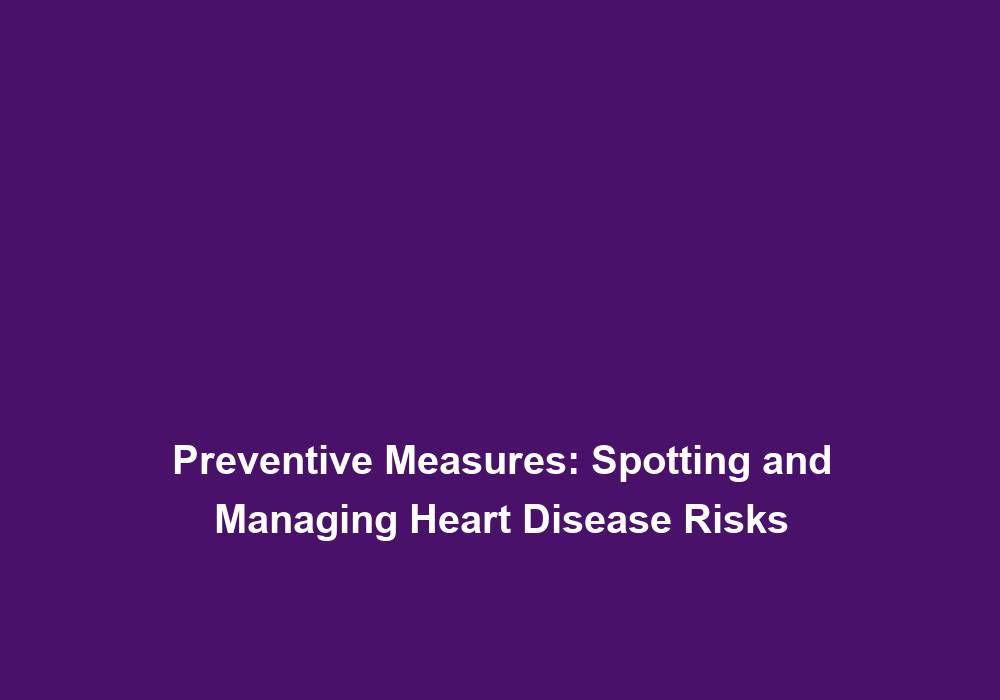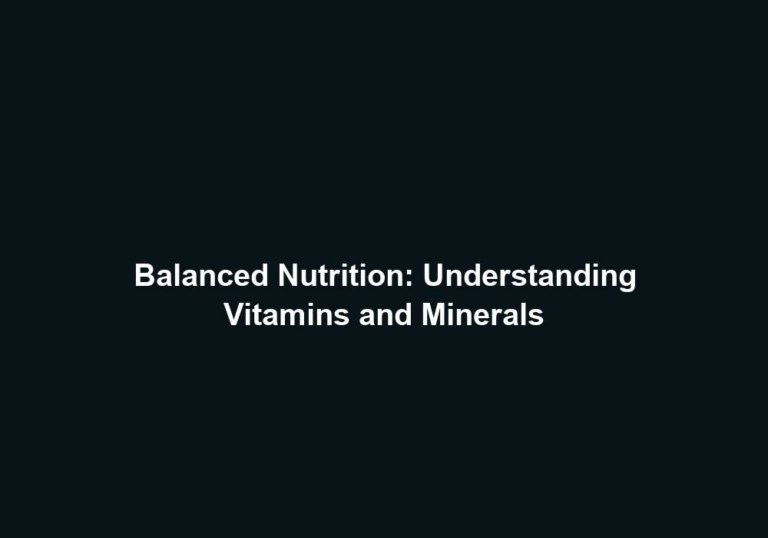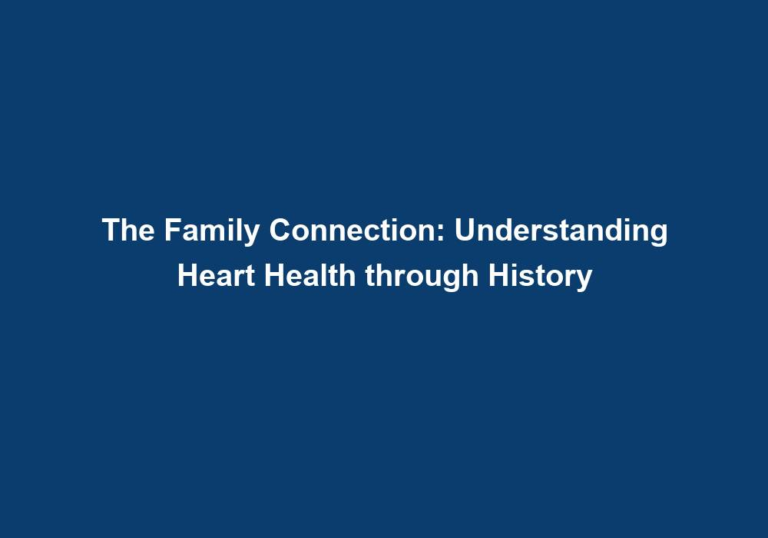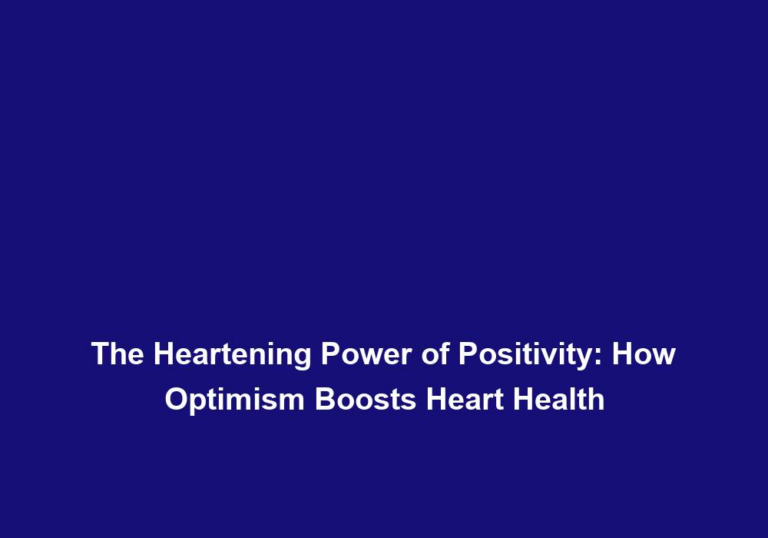Preventive Measures: Spotting and Managing Heart Disease Risks
Heart disease is a prevalent and potentially life-threatening condition that affects millions of people worldwide. It is crucial to understand the risk factors associated with heart disease and take preventive measures to ensure a healthy heart. By proactively monitoring and managing these risks, individuals can significantly reduce their chances of developing heart-related complications. This article aims to provide comprehensive information and guidance on spotting and managing heart disease risks.
Understanding Heart Disease
Before delving into preventive measures, it is essential to comprehend what heart disease entails. Heart disease refers to a range of conditions that affect the heart’s structure and function. It can manifest as various ailments, including coronary artery disease, heart attacks, heart failure, and arrhythmias.
When it comes to heart disease, understanding its various forms and how they can impact your overall health is crucial. Coronary artery disease is the most common type of heart disease, characterized by the narrowing or blockage of the blood vessels that supply the heart muscle with oxygen and nutrients. This condition can lead to chest pain, shortness of breath, and even heart attacks. Heart failure occurs when the heart is unable to pump enough blood to meet the body’s needs, resulting in fatigue, fluid retention, and difficulty breathing. Arrhythmias refer to abnormal heart rhythms, which can cause palpitations, dizziness, and fainting.
Recognizing Risk Factors
To effectively manage and prevent heart disease, it is crucial to spot the risk factors associated with this condition. By identifying these factors, individuals can make informed decisions and take appropriate actions to reduce their risk. Some common risk factors include:
- High Blood Pressure: Hypertension, or high blood pressure, significantly increases the risk of heart disease. Regular monitoring and maintenance of blood pressure levels within the healthy range are essential.
High blood pressure, often referred to as the “silent killer,” can damage the blood vessels and strain the heart. It is important to monitor blood pressure regularly and take steps to keep it under control. This can be achieved through lifestyle modifications such as adopting a healthy diet, reducing sodium intake, exercising regularly, managing stress, and, if necessary, taking prescribed medication.
- High Cholesterol: Elevated levels of cholesterol, particularly low-density lipoprotein (LDL) cholesterol, can contribute to the development of heart disease. Adopting a heart-healthy diet and lifestyle can help control cholesterol levels.
Cholesterol is a waxy substance that can accumulate in the arteries, restricting blood flow to the heart. It is important to maintain healthy cholesterol levels by consuming a diet low in saturated and trans fats, increasing fiber intake, and incorporating foods rich in omega-3 fatty acids. Regular exercise and avoiding smoking are also beneficial in managing cholesterol levels.
- Smoking: Smoking tobacco significantly increases the risk of heart disease. Quitting smoking is one of the most effective ways to reduce this risk and improve overall heart health.
Smoking damages the blood vessels, reduces oxygen supply to the heart, and increases the formation of blood clots. Quitting smoking is essential for preventing heart disease and its complications. Support from healthcare professionals, nicotine replacement therapies, and behavioral counseling can greatly increase the chances of successfully quitting smoking.
- Obesity: Excess body weight, especially when concentrated around the waist, can lead to various heart-related complications. Maintaining a healthy weight through a balanced diet and regular exercise is paramount.
Obesity increases the strain on the heart and raises the risk of developing high blood pressure, high cholesterol, and diabetes. Adopting a healthy eating plan that limits calorie intake, choosing nutrient-dense foods, and engaging in regular physical activity can help achieve and maintain a healthy weight.
- Diabetes: Individuals with diabetes are at an increased risk of developing heart disease. Proper management of blood sugar levels, along with regular check-ups, can help mitigate this risk.
Diabetes can damage blood vessels and nerves, increasing the risk of heart disease. It is important for individuals with diabetes to maintain good glycemic control through a combination of healthy eating, regular physical activity, monitoring blood sugar levels, and taking prescribed medications as directed by their healthcare provider.
- Family History: A family history of heart disease can predispose individuals to a higher risk. Being aware of this genetic predisposition can prompt individuals to take preventive action early on.
Having a close relative, such as a parent or sibling, with heart disease increases the likelihood of developing the condition. While genetics play a role, it is important to remember that lifestyle factors also contribute significantly to heart disease risk. Individuals with a family history of heart disease should be proactive in adopting a heart-healthy lifestyle and seeking regular medical check-ups.
- Sedentary Lifestyle: Lack of physical activity and a sedentary lifestyle can contribute to the development of heart disease. Incorporating regular exercise into daily routines is essential for maintaining heart health.
Leading a sedentary lifestyle increases the risk of obesity, high blood pressure, and high cholesterol. Engaging in regular physical activity, such as brisk walking, cycling, swimming, or dancing, can help strengthen the heart, improve circulation, and reduce the risk of heart disease. Aim for at least 150 minutes of moderate-intensity aerobic activity or 75 minutes of vigorous-intensity activity per week.
Preventive Measures
Now that we have identified the risk factors, let’s explore effective preventive measures to manage heart disease risks:
1. Healthy Diet
A heart-healthy diet forms the foundation of preventive measures against heart disease. Here are some key guidelines to follow:
- Reduce Sodium Intake: High sodium consumption can increase blood pressure. Limiting sodium intake by avoiding processed foods and opting for fresh, whole foods is recommended.
Excessive sodium intake can raise blood pressure and strain the heart. To reduce sodium intake, it is important to choose fresh, unprocessed foods and limit the use of salt in cooking and at the table. Reading food labels can help identify hidden sources of sodium in packaged and processed foods.
- Increase Fiber Consumption: Consuming a diet rich in fruits, vegetables, whole grains, and legumes promotes heart health. These fiber-rich foods can help lower cholesterol levels and maintain a healthy weight.
Fiber plays a crucial role in heart health by reducing cholesterol absorption, improving blood sugar control, and promoting satiety. Including a variety of fruits, vegetables, whole grains, and legumes in your diet can help increase fiber intake. Aim for at least 25-30 grams of fiber per day.
- Choose Healthy Fats: Opt for unsaturated fats, such as those found in nuts, seeds, and avocados, over saturated and trans fats. These healthier fats can positively impact cholesterol levels.
Replacing saturated and trans fats with healthier fats can help improve cholesterol levels and reduce the risk of heart disease. Choose sources of unsaturated fats, such as olive oil, canola oil, nuts, seeds, and avocados. Limit the consumption of saturated fats found in red meat, full-fat dairy products, and tropical oils.
2. Regular Physical Activity
Engaging in regular exercise is crucial for maintaining a healthy heart. Aim for at least 150 minutes of moderate-intensity aerobic activity or 75 minutes of vigorous-intensity activity per week. Incorporate activities that raise your heart rate and strengthen your muscles into your routine.
Regular physical activity has numerous benefits for heart health. It helps lower blood pressure, improve cholesterol levels, manage weight, reduce stress, and enhance overall cardiovascular fitness. Choose activities that you enjoy and make them a part of your daily routine.
3. Smoking Cessation
Quitting smoking is a vital step in reducing heart disease risks. Seek professional help, join support groups, or explore nicotine replacement therapies to increase your chances of successfully quitting.
Smoking damages the blood vessels, increases the risk of blood clots, and reduces the amount of oxygen available to the body. Quitting smoking is one of the best things you can do for your heart health. Seek support from healthcare professionals, join smoking cessation programs, and consider nicotine replacement therapies to help overcome the addiction.
4. Manage Stress Levels
Chronic stress can contribute to heart disease risks. Implement stress management techniques such as meditation, deep breathing exercises, and engaging in activities you enjoy to alleviate stress and promote heart health.
Stress can negatively impact heart health by raising blood pressure, increasing heart rate, and promoting unhealthy coping behaviors, such as overeating or smoking. Managing stress through relaxation techniques, regular exercise, spending time with loved ones, and pursuing hobbies can help reduce the risk of heart disease.
5. Regular Health Check-ups
Regular visits to your healthcare provider are crucial for monitoring your heart health. These check-ups allow for the early detection of any potential issues and enable timely intervention.
Regular health check-ups, including blood pressure measurements, cholesterol screenings, and diabetes screenings, help assess your risk of heart disease. Your healthcare provider can provide personalized recommendations based on your individual health status and help you manage any existing conditions effectively.
6. Medication Adherence
If prescribed medication for managing blood pressure, cholesterol, or other heart-related conditions, ensure strict adherence to the prescribed regimen. Consult with your healthcare provider regarding any concerns or side effects.
Medications play a vital role in managing certain risk factors for heart disease, such as high blood pressure and high cholesterol. It is important to take prescribed medications as directed by your healthcare provider, even if you feel fine. Regularly discuss any concerns or side effects with your healthcare provider to ensure optimal medication management.
7. Limit Alcohol Consumption
Excessive alcohol consumption can increase blood pressure and contribute to various heart diseases. If you choose to drink, do so in moderation, following the recommended guidelines.
While moderate alcohol consumption, such as one drink per day for women and up to two drinks per day for men, has been associated with certain health benefits, excessive drinking can have detrimental effects on heart health. It is important to be mindful of your alcohol intake and, if you choose to drink, do so in moderation.
Conclusion
Preventing heart disease requires a proactive approach in spotting and managing the associated risks. By understanding the risk factors, adopting a heart-healthy lifestyle, and seeking appropriate medical guidance, individuals can significantly reduce their chances of developing heart-related complications. Remember, prevention is always better than cure when it comes to your heart health. Prioritize preventive measures and make informed choices for a healthier heart and a better quality of life.
Disclaimer: The information provided in this article is for educational purposes only and should not be considered as medical advice. Please consult with your healthcare provider for personalized guidance and recommendations regarding your specific circumstances and health condition.







